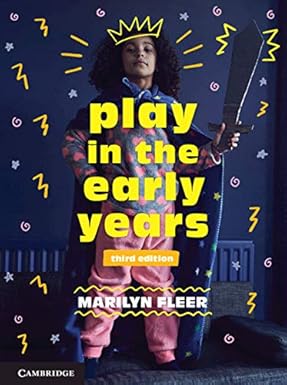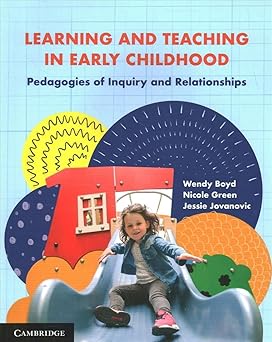Skip to Main Content

eBooks
-
-
-
 Theories of Childhood (2013)
This is a popular guide to help early childhood professionals be aware of the theories behind good child care practices.
Theories of Childhood (2013)
This is a popular guide to help early childhood professionals be aware of the theories behind good child care practices.
-
 The Thinking Child (2010)
The book considers the most recent research into the brain and learning, and offers practical advice on how to reflect these findings in the classroom.
The Thinking Child (2010)
The book considers the most recent research into the brain and learning, and offers practical advice on how to reflect these findings in the classroom.
Websites
-
AEDC resources for leaders and educators
The Western Australian AEDC school and early childhood education and care engagement kit is a package of resources to assist the school and early childhood education and care sectors to engage with and build a deeper understanding of the AEDC.
-
Articles for Families on Play
A range of research based resources - provided from NAEYC (National Association for the Education of Young Children)
-
Australian Children's Education & Care Quality Australia
The Australian Children’s Education & Care Quality Authority works with all governments to provide guidance, resources and services to support the sector to improve outcomes for children.
-
Belonging, Being & Becoming - The Early Years Learning Framework for Australia
Approved learning framework under the NQF for young children from birth to five years of age - website
-
Department of Education WA
"We provide staff, facilities and resources to a number of entities created under legislation enacted by the Western Australian Parliament or by Ministerial administrative action"
-
Montessori Australia
"Montessori materials are designed to stimulate the child into logical thought and discovery."
-
My Time Our Place: Framework for School Age Care in Australia V2.0 2022
My Time, Our Place: The Framework for School Age Care is the national approved learning framework under the NQF for school age children.
-
National Quality Standard
"The National Quality Standard (NQS) sets a high national benchmark for early childhood education and care and outside school hours care services in Australia. "
-
Observing, Planning, Guiding: How an Intentional Teacher Meets Standards Through Play
"Observing, Planning, Guiding: How an Intentional Teacher Meets Standards through Play"
-
Play and Learning
Raising Children Network
-
Reggio Emilia Approach
The Reggio Emilia Approach® is an educational philosophy based on the image of a child with strong potentialities for development and a subject with rights, who learns through the hundred languages belonging to all human beings, and grows in relations with others.
-
Reggio Emilia Australia Information Exchange
The Reggio Emilia Australia Information Exchange (REAIE) is a national reference organisation for the educational project of Reggio Emilia in Australia, and an invited member of the Reggio Children International Network.
-
Steiner Education Australia
"Steiner education enables children to grow into adults who, out of themselves, are able to find meaning and purpose in their own lives. Contemporary education needs to be deeply human centred, to recognise that we are Human by Nature."
-
What Makes a Good Play Area for Children?
"This brochure summarises playground characteristics most enjoyed by children and those which encourage socialisation, imaginative play and physical activity."
Online Videos
-
Early Childhood Australia - Learning Hub
NSQ PLP / EYLF videos via YouTube - you can subscribe to their channel
-
Intentional Teaching
4 videos from Qld Studies Authority:
Extending children's ideas
Responding to children's ideas and interests
Learning through routines
Group learning
-
The Montessori Method
The Montessori Method still deeply divides the education world. Maria Montessori's philosophy grew from her work with children in the slums and today the Montessori International Association is operating in some of the poorest and most challenging areas of the world.
Books in the Library
-
-
-
-
 Play in the Early Years (2021)
Play is crucial to the learning and development of children in the early years. The third edition of Play in the Early Years is a comprehensive introduction to the theory and practice of play for children from birth to 8 years old.
Play in the Early Years (2021)
Play is crucial to the learning and development of children in the early years. The third edition of Play in the Early Years is a comprehensive introduction to the theory and practice of play for children from birth to 8 years old.
-
 Theories of Childhood (2013)
This best-selling resource provides clear, straightforward introductions to the foundational theories of John Dewey, Maria Montessori, Erik Erikson, Jean Piaget, and Lev Vygotsky.
Theories of Childhood (2013)
This best-selling resource provides clear, straightforward introductions to the foundational theories of John Dewey, Maria Montessori, Erik Erikson, Jean Piaget, and Lev Vygotsky.
-
-

 Play in the Early Years (2021)
Play is crucial to the learning and development of children in the early years. The third edition of Play in the Early Years is a comprehensive introduction to the theory and practice of play for children from birth to 8 years old.
Play in the Early Years (2021)
Play is crucial to the learning and development of children in the early years. The third edition of Play in the Early Years is a comprehensive introduction to the theory and practice of play for children from birth to 8 years old.
 Understanding Child Development (2017)
This book introduces pre-service and in-service teachers to the unique qualities of young children from infants to age eight.
Understanding Child Development (2017)
This book introduces pre-service and in-service teachers to the unique qualities of young children from infants to age eight.
 Learning and teaching in early childhood: pedagogies of inquiry and relationships (2021)
Reflecting the fact that there is no single correct approach to the challenges of teaching, this book explores teaching through two lenses: teaching as inquiry and teaching as relating.
Learning and teaching in early childhood: pedagogies of inquiry and relationships (2021)
Reflecting the fact that there is no single correct approach to the challenges of teaching, this book explores teaching through two lenses: teaching as inquiry and teaching as relating.